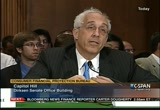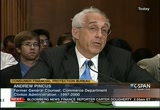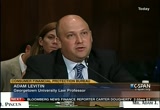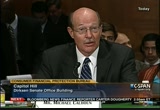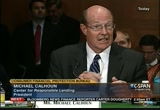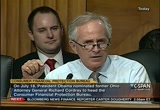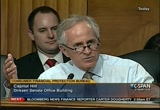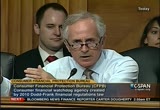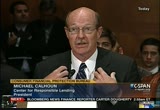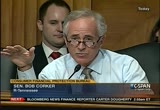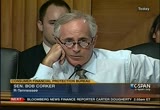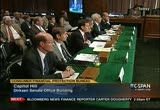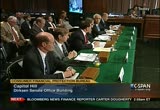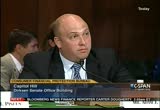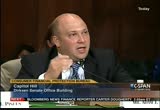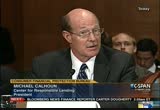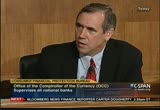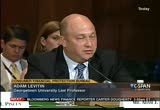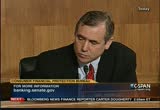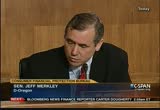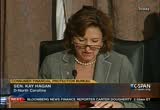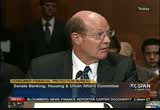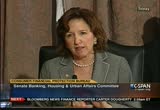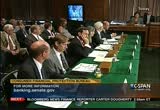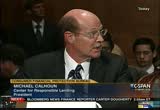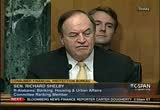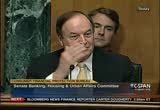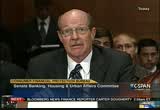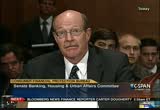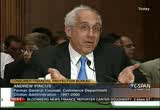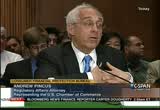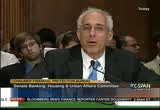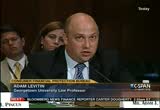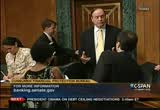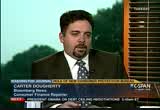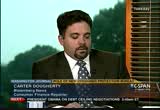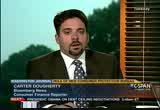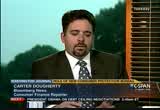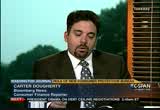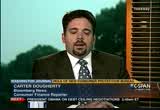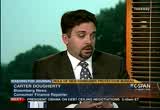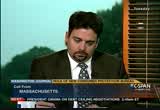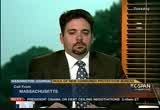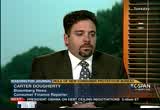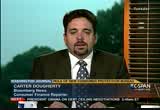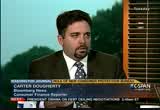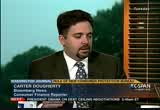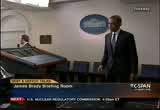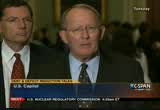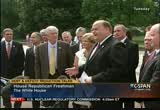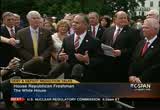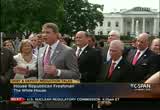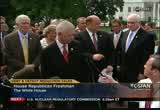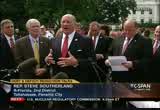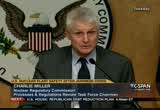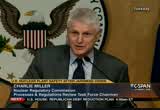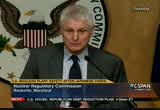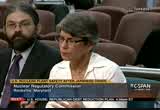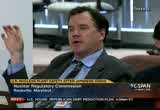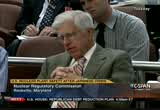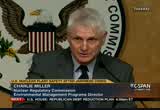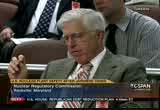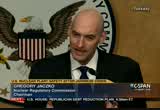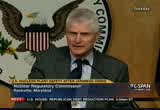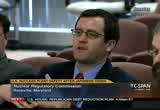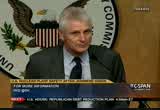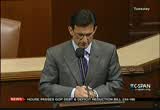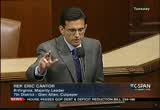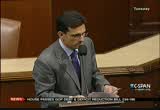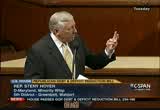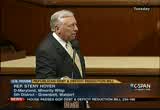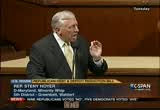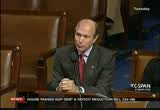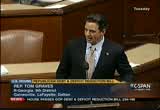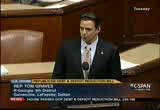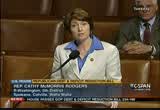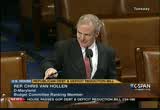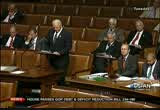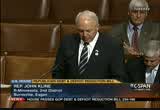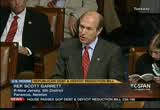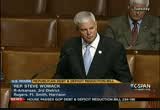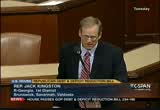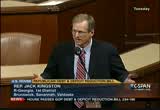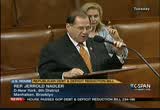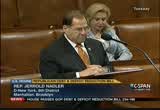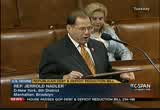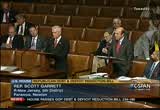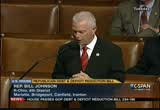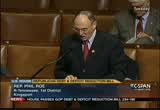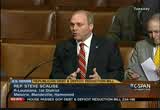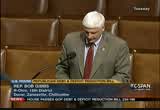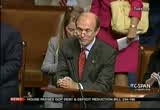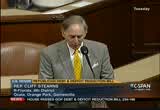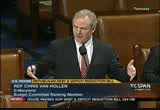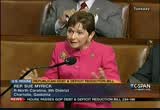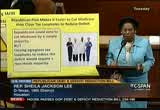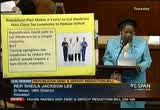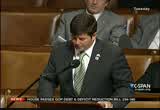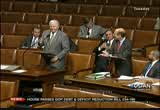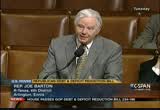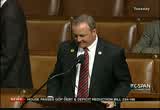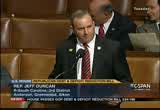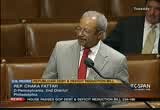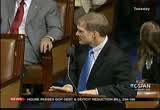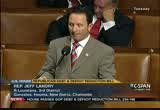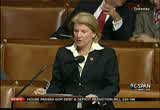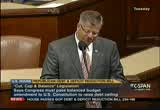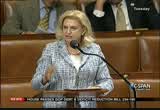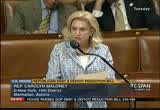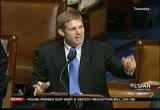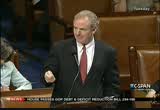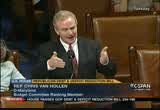tv Today in Washington CSPAN July 20, 2011 2:00am-6:00am EDT
2:00 am
regulator, but the problem is it is a new regulator that has none of the checks and balances designed to ensure accountability. they are the features of our government structure. >> how about the fcc's with respect to regulation? by the way, they were subject also. you think they were affected regulators with the structure in place? >> the chamber should report before the financial crisis, saying changes were needed. on the other hand, if you looked at the federal trade commission, many would say that it has been an extremely effective consumer regulator, and if you compare it to the antitrust commission, many people would say it has been an
2:01 am
effective antitrust regulator. >> i would like to go to mr. leviton. what is your opinion? >> he has been very kind. the fcc has tried but it has been held on a tight leash by congress, and if you think back to 1980, the sec tried to target who -- to ban things targeting children as unfair, and what happened? congress showed off the budget. and we see congress acting on cigarette ads targeting children. i did not know if that is how we want to do regulation. most instructive is
2:02 am
with the office of currency. the u.s. code expressly prohibits the u.s. treasury secretary from the laying of rule making is. -- delaying rule making. of thes the analog av cfpb. part of creating it was to create a counterweight, recognizing consumer protection and safety and soundness need to be balanced with parallel agencies. >> i think with this discussion, we have overlooked the most fundamental checks and balances, and that is a
2:03 am
constitutional authority of congress through the normal process. there have been repeated instances where agencies have taken action congress thought was inappropriate, and congress has revised the structure or rules of that agency. by changing the structure of agency, when the federal reserve's proposed modest credit card reforms, far less comprehensive than what was to deny food, -- knew what was enacted, though cc declared those as a threat to the safety and soundness of the banking system, and it is live view point that makes us concerned about putting it in a place
2:04 am
where it can veto a readily the actions of the consumer bureau. >> thank you for your testimony. i know my friend from rhode island was not suggesting the because people have failed we should not have any checks and balances in these organizations. i know that cannot be possible. i know you know that a lot of us tried to figure out a way to cause this thing to have some checks and balances, and i guess i ask this question. i do not understand why there has been a major victim of an -- victory in having a consumer protection agencies. i do not understand why people have tried to press into the ideological divide to say this
2:05 am
one entity is one that should have no checks and balances. i would not confirm me as the head of this agency. i would ask, why is it we have taken this one agency -- there have been modest request, and one thing you are forgetting is there is going to been a democratic appointee. there could be some ideological republican some point at the opposite side that repeals ipsa] t. i do not understand why you have done this and why you have not been willing to sit down and say, you are right.
2:06 am
maybe we ought to have a few checks and balances were everyone will cease united. >> thank you for your work on this. this really is where the rubber meets throned -- meets the road on the financial crisis. you have an occ whose responsibility is safety and sound. that has been the guiding philosophy based on the one thing you continued to lead and at of theye out is th can choose not to be regulated
2:07 am
by the occ. apples to apples. >> history has shown the because of the feature, its hilton the occ's perspectives to be more pro-bank end and dying-consumer. countrywide objected to the very wide restrictions put upon it, and they slipped. >> why are you using that as an example. it is not an example. >> it will be the primary regulator. the consumer protection bureau and its director need to be on
2:08 am
par to move us, and we agreed in a balanced way forward, but i would tell you again, everyone in the agencies and in particular the consumer bureau is very aware that at the end of today, for them to be sustainable, they have to stay in line with where the congress and the administration and the political process is, because we that. the fcc in the 1970's step further than they thought it should. >> i think you all have needlessly created an issue that created a divide over financial regulations in general, which
2:09 am
meant the only way it could pass was with all democrats, which meant it was lopsided and we ended up with lack of clarity, and i want to say, i think this was a gross mr.. -- gross misstep. you have a point in time when you could have created checks and balances, and we ended up with the federal reform bill that was not what it could have been, and to meet someone this is a great example people taking an ideological viewpoint and taking a really bad legislation on a number of fronts. if you knew the person appointed was going to use this position
2:10 am
to run for statewide public office in a few years and is told people about, the you believe that would be the right person for this job? >> i think the person should have qualifications. >> there is no accountability a . if somebody wants to run for a government, and they were going to do this in the interim and make a name for themselves, would you consider them an appropriate nomination? >> i did not think that disqualifies them.
2:11 am
>> thank you. >> i want to welcome the witnesses and to say that history has shown our country has been great because whenever we have been challenged, we have been able to come up with legislation that has turned our country around, and i think the dodd-frank bill has done the a because of crises in the face. face.ause of crosstreecrises we there has been failure to address consumer protection agencies, and to me, this is
2:12 am
what it is all about. a 2006 report from the paid a lending -- found that payday lending had a negative affect. this was further evidence and junior enlisted service members are particularly vulnerable to predatory lending practices. you see any existing gaps in consumer protection for members of the armed forces to insure our service members maintain a high level of readiness in defense of our nation? what role can they play in addressing these gaps? >> i would say largest gaps, and
2:13 am
my testimony attempted to highlight the loopholes that have been created by financial regulations adopted after the military lending act was enacted, which allows a lenders, title lenders to create products that with themselves outside of the coverage of the military lending act, so that takes , thatto 36% interest capsul allows them mandatory unilateral arbitration, which prohibits military members being able to have access if they do have problems with these products. i think the loopholes that have
2:14 am
been created have watered down the military lending act to make it almost since if it -- almost ineffectual to protect the interests service members. one big gap with the military lending act is it does not apply to automobile financing, and one thing many young enlisted do when they get their paycheck is to try to purchase an automobile. i think also the protections should be expanded. veterans are not covered by the military spending act. older americans are not covered, and talking about checks and balances, we have businesses putting mandatory unilateral arbitration clauses in the contract, which allow consumers no redress if they are harmed by
2:15 am
these high cost, unfair product set are leading them of their bank accounts, robbing them of vehicles, and taking their homes away, leaving them and their families without a place to live secure a good -- a place to live. >> in your testimony, you find a trade-off the sometimes arises between consumer protection and a profitability -- and bank profitability. can you talk about the trade-off and what influence it should have? >> of course. there is a balance of regulatory agencies are trying to strike
2:16 am
between bank safety and soundness and consumer protection during debate safety and soundness sounds like a technical term, but it is simply profitability. unfortunately, the way the regulations were was that consumer protection and safety and soundness were entrusted to the same agency, and they consistently put a profitability ahead of consumer protection. -- put bank profitability ahead of consumer protection. now consumer protection has of fighting chance. we need profitable thanks in our country, but i do not think we have any public policy concerns. as long as they are profitable,
2:17 am
there is no concern about how much. it is simply that they be profitable. banks want to increase profits. as long. -- as long as the cfpb does not create any risks, there is no reason to be concerned. the veto insurers it does not create a systemic risk now and instead allows it to find the right level of consumer protection. >> may i comment on that? >> yes. >> i st. i can ensure you -- i can ensure you they look closely
2:18 am
at compliance with every consumer law and are severe beyond all means if they are not in compliance. we spend an enormous amount of money trying to comply if every day, and i say to suggest anything done to us would never rise to that level. i take exception to that. >> we have heard about the federal trade commission being a very effective regulator. it is my impression is they are mortgage brokers, and they engaged in steering into predatory loans.
2:19 am
we have the rates with families being locked in by the penalties, so where was the ftc during all this? >> i think you sought a variety of influences, and they are ones proposed today that would handcuff a consumer hero. -- the consumer bureau. there was a deadlock on the commission. there has been a general challenge with a confirmation process across the board, and this body has been looking at ways to improve that, and that raises concerns, but to see if the -- the cfpb -- we saw this
2:20 am
appropriations process again, and this is a concern. hud also have authority over mortgage brokers and moved to change these kickbacks. there were appropriation writers to dissuade them from moving in that direction, and they backed off, and that was a direct contributing cause to our crisis, so those were new to the concerns we have. those agencies were not effective. law enforcement actions were really start with agency as well. >> we think we had issues with companies creating remote post offices so they would change the days each month so a whole
2:21 am
series of clever actions to run up fees. why did occ object to these mild considerations? >> they were concerned it would affect short-term profitability of the yanks. >> appears under the argument to protect short-term profitability, long-term structural problems were able to a merge, and personal finances were undermined, and we ended up with mortgage practices turning to securities that blew up our entire system. why was short-term profitability put over a long term soundness of our system? >> i think a lot of it has to do with competitions of charters, that banks can shop for the regulator, and that has serious consequences.
2:22 am
they spoke about it earlier about how the ability to shop for charters has created a race to the bottom in bank regulation, and those cc gets its budget from not the appropriations process but rather from fees it charges to the thanks it charters. if it wants a larger budget, it has to occur more thanks. it needs more regulation -- it means less regulation. >> you mentioned the military lending act and the fact there are loopholes and a lot of pieces are not being effectively regulated. who is the regulator, and how do we fix these loopholes? is it a regulator issue?
2:23 am
>> i believe it is a regulator issue, and the regulations that were provided were narrowed. there are very few products that are actually covered, and it is very easy for any lender to create a loan product set is 92 days as opposed to 90 days to completely allow it to avoid regulation altogether. the department of defense is the actual entity that regulates the military spending are, and the department of defense has a lot of other matters on its mind rather than regulating financial industries. >> i just want to note said as
2:24 am
we look into the details, we hud's effortss -- were stymied. the fed's efforts were stymied. there are so many of these issues it started with various consumers and ended up to be huge systemic risk, and i think it helps us to understand why the cfpb is such an important institution. >> first, i want to echo the comments from senator reid and many colleagues about the needs to preserve independent funding for one of the original sponsors of the bill. i believe in it strongly. we have seen debates over funding. some members of congress use the power of the purse not just to
2:25 am
hold agencies accountable but to underline their mission and achieve the regulation through the back door is a bad thing. we know most republicans oppose the creation of the cfpb, and the fight is about accountability. i should also point out the bureau is not funded by taxpayer dollars, and it is an irony that many of the same members of congress to express so much concern over the deficit want to to the taxpayers' tab. i spent 10 years on this, because it was not the fed's mission. even when they look at issue, they looked at the lens of safety and sound, and that is why we need an independent board. my question is related to that. a recent study found nearly half of all checking account
2:26 am
disclosure statements provided by the 10 largest thanks run over 111 pages. the report found half of all banks have more than 49 different hidden fees in these disclosure statements, and americans are expected to pay $38 billion in overdraft fees in 2011 alone. i propose an easy to read checking fee disclosure statement on all checking account applications similar to what i champion when i was a congressman in the house, and it has been very successful. we are not talking government regulation. we are talking adam smith, disclosure of is how the economy is supposed to exist. the key terms of any checking account including account closing fees and other important sees like the terms of overdraft
2:27 am
fees, etc., so i want to ask, would you support a new disclosure for checking accounts? >> the box that was used for credit cards is an important advance for credit cards. this would also be for checking accounts, and what is particularly needed is many banks are adjusting the fees they are charging, and they change them frequently, and it is very hard for consumers to move from one account to the other, and it is important to know before they get into it. >> how about you? >> enthusiastically. >> how about you? >> we support simplification and disclosure so the customer understands it clearly, and the that is that cand be, fine as long as it does not violate the other things we are
2:28 am
mandated to do. i think the same thing for mortgages. from my standpoint, the simpler we can do it, and the better. have 111 pages. i think there is too much paperwork mandated by various laws and regulations, and simplification of that would be very welcome. >> i would ask you to go through your views. >> a lot of the problems caused is because they are being crafted as non-loan products,
2:29 am
and lends disclosures are not being provided at all. >> i know we are very supportive of simplification. we would be supportive of a simpler process. >> if you could show my proposal, i would be interested in a written answer as to whether they support it or not. >> i think saturday disclosures are important. it would allow an apples to apples disclosure, and that would allow consumers to get the best deal. >> when it went into effect, it did bring interest rates down, because there was real competition. many people proposed a cap on
2:30 am
2:32 am
they are non-chargeable and sect in the most ordinary circumstances for that follows them to degrade. there have been repeated studies at showing overreaching with these loans. providing loans that people do not have the ability to repay. the loans are made by the educators gets paid, the taxpayers are then left for the bills, along with the families. it is a very serious problem and one example where there is better regulatory gap that needs to be carefully looked at. >> thank you. mr. shaefer, i understand from your testimony, your bank has
2:33 am
been for delinking in its approach to handling overdraft fees. in april of this year, the pew released a study that highlighted several of the zero draft procedures that may be harmful to customers. can you tell us about the overdraft policies truliant have instituted? >> with the reform, the opt-out overdraft protection was eliminated. we never had opt-out. our members were always aware of their options other than banks of high overdraft the such as advancing a line of credit or taking a draft from savings. relative to cfpb, they have indicated a willingness to allow innovation. in the area of overdraft
2:34 am
protection, there is a lot of room for innovation. i hate to give up the other to my own competitors, but coastal credit union in north carolina has a early-warning notification on not sufficient charges. we intend to implement that as well. you get a notice on your pta and you have 10:00 in the morning -- you have until 10:00 in the morning to secure it. they have backed away from plain vanilla and that is good. innovation comes from the shops trying to help their members. we will have some ways to draft what we consider an overpayment of an overdraft fees. >> mr. callahan, i worked aggressively to oppose payday lenders that prey on the familyies throughout the state.
2:35 am
and we were successful at a effectively ending the practice and north carolina. under dodd-frank, it granted the cfpb certain authorities over the payday lenders. you feel that these authorities are sufficient to curtail the practices? what are the hurdles that the cfpb may face in the future as it attempts to regulate these predatory practices? >> it does have explicit authority there and it is badly needed. wally urge the cfpb, and i think it is moving forward carefully with a lot of research, hurt -- looking at the markets, reaching out to businesses, there is as i indicated in my testimony and immediate crisis. the national banking regulators are allowing our biggest banks to come in and offer payday loans out of the national bank, even in states that expressly prohibit those loans. we just think that is the wrong
2:36 am
direction for lending in general. but particularly for a flagship institution. >> thank you, mr. chairman. >> senator mendndez. >> thinking to all witnesses. i would like to ask professor levitin, have you seen the cfpb's know before you owe effort? >> i read about it. >> mr. calhoun, had you seen that? >> yes, have . >> to my mind, it is something to simplify the mortgage disclosure forms. is the new form being performed -- proposed by the cfpb and going to consumer testing right now better than the existing forms?
2:37 am
>> yes, and my understanding that it has received accolades from both those consumer advocates as well as mortgage lenders. we look at it for the lands of both, being affiliated with a substantial mortgage lender. it is a place where consolidating the authority, it is what you had for more than a decade. the federal and serve both having authority in that area and being unable to agree on even a simple disclosure form. it was a place where we see the value of the consumer bureau been demonstrated. we also see the care with which the consumer borough has moved forward with that proposal. this horrible agency has done something that prior to existence no one could create. so simplifying a clear opportunity for the consumer to understand what they are entering into and get the mortgage lenders, the private
2:38 am
sector to actually have a simpler, more modified, more efficient process -- is that what happened here? >> that is what is happening, certainly in the context of this form. >> that is interesting. what do you think about the bureau's new consumer complaint process their crops complaints to financial service providers for resolution and gathers information about those complaints? >> i think that will be a very effective mechanism consumers do not now known cure to turn to. when they turn to federal regulatory agencies, they do not receive relief from those agencies. many of the products i have talked about, the state regulatory agencies just do not have any control over it. they are either acting under the auspices of a national bank, or they are importing interest
2:39 am
rates from other states, for quite frankly the state regulatory authority does not have the funding to address some of the significant needs of consumers. one of the of the things i wanted to mention that has not been mentioned yet was the office of financial literacy. i think this is a very important aspect of the consumer financial protection board, because i think consumers should be learning about consumer finance even before they become consumers. >> our to read some quotes that exist from the american bankers association, all of these are concerns about bills created in new financial bureaus, and i think you'll be able to tell which ones i am talking about. "no one is born aspect of the economic life of this country, whether the agriculture or
2:40 am
banking our commerce, which will not be adversely affected by this bill." "no one with any practical the planets with the business practice could lead to these regulations and arrive at any verdict other than that they would cripple and retard business rather than help provided. even so clear it is hard to keep from wondering if results were intended." "if passed by congress, this bill will destroy our security markets and a necessary consequence interrupt the flow of credit and capital in the business." "the bill is so unsound it will force its own repeal." not one of these quotes is about the cfpb. each " is about the creation of the fdic from the 1930's when there were created response to the great depression. each quote sounds like what we
2:41 am
are occurring with the cfpb. it was in response to the financial crunch -- a catastrophe of 2008. i cannot understand why it is that we have such an inversion -- this would be equivalent saying, we do not like what the epa does so we will not let it have a head. we do not believe in medicare the way that it is so we will not let it have a head of the agency. so we are destined at the end of the day not have a well performing agency, certainly as well as it could perform, without having leadership at the end of the day that can make sure that it is responsive to the congress and to the original intentions that we had for this consumer protection board. the same types of shrill and overblown rhetoric that has marked the current debate is what i see in the speeches that took place in the releases that were issued as it related to the fdic and the ftc, two
2:42 am
entities that we now think, notwithstanding some of their shortfalls here and there, had acted in the interest of the marketplace. have acted in the interest of investors and in the interests of depositors, have acted in the interest of consumers. i think that is really the case here as well. thank you, mr. chairman. >> senator shelby has two more questions. >> thank you for your indulgence. professor levitin, in your testimony today you have clearly expressed your believe that the otc and other financial regulators have not done a good job of oversight that -- overseeing our financial system. i think that is a given. accordingly, do you support reforming the otc and other regulators to make them more accountable? >> yes. >> thank you. mr. calhoun, in your testimony
2:43 am
coming you severely criticized the office of the comptroller of the currency's actions in the lead up to the financial crisis. noting several for all areas where the ftc acted irresponsibly -- otc acted irresponsibly. it is worth noting that other than the bureau that we're talking about here, the comptroller is probably the least accountable of our financial regulators, at least a lot of people believe that. do you believe, sir, that the otc should be held accountable for its actions? do you? >> i believe they should. i think primarily by -- >> you do believe that as a regulator it should be held accountable as its actions. >> i think it has accountability in many respects now. >> i did not ask you that. >> i think everyone thinks of. >> would you support an effort to make them more accountable to
2:44 am
congress? would you support an effort to make the otc and other regulators more accountable to congress? >> we would support an effort to make the otc comparable with the cfpb, because they are the two player lawyers of financial oversight. protecting safety and soundness, and they should be comparable, because they do represent the two interests that need to be at the table in balance. >> but would you support -- again, let me be clear, my question is this -- would you support efforts in the congress to make the otc and other financial regulators more accountable to the congress? either yes or no. >> i do have concerns about interference there. for example -- >> say you are modifying your
2:45 am
position. >> the specifics matter. in the savings-and-loan crisis, we saw intervention that prevented the regulators from stepping in and preventing greater collapse in that industry. and so it is a difficult balancing, but there are reasons to have protections and independence with the financial regulators, because short-term interventions are the tyranny of small decisions that create a huge consequences, and again, i would not want for example the otc to be subject to intervention every time they tried to close down a bank. >> neither would we. >> that is what has happened in the past. >> they have to have the ability in the power to do their job, but my question to you, again, would you support efforts to make them more accountable? if they failed the american
2:46 am
people, which most people believe that the financial regulators failed the american people, the federal reserve, the fdic, the comptroller of the currency, and so forth. i believe from this point on the committee, they fail the american people leading up to the financial crisis. my question again -- which is support efforts to make them more accountable? >> i do not think their problem is -- the problem is their lack of accountability. >> you do not believe that? had you fall of the hearings on what led up to the crisis? i think unit to go back and look at them if you do not believe this lack of accountability -- everybody says that i know of, but for this committee and anywhere else, that it is a problem of accountability. >> that surprises me somewhat because i have not seen the proposals. i can go back and lick it is
2:47 am
because -- >> i think you're standing alone here. >> there is up point that he is trying to make. accountability is important. i hope everyone on this panel agreed that we should have more accountability for federal bank regulators. but the question is how do we do that. >> absolutely . >> that every form of accountability is appropriate. >> but accountability is inborn. >> without a doubt. -- important. >> without a doubt. >> there is a fundamental question of government here and who ultimately everyone is accountable to, which is the people. i do think that accountable to elected officials, although we might not all like everything the congress and the president to every time, ultimately there will be people in whom the people have proposed their trust.
2:48 am
it seems there is a fundamental part of our government there. when someone says, for example, it is an interference because in a proper and spill, there is a provision to our regulator, you may or may not do something for that is something that both halves of congress approved and the president signed. maybe it is bad but it is what the people representatives decided. one point about the otc. i think several people on the panel have said we want to make the bureau director on a par with the comptroller. i think it is very important to know that the statutory language is very different. a controller the last comptroller does that control the press doesn't -- a presidential removal power, that the bureau provision does. that is the reason why, and i want to correct professor levitin's statement, it was the office of legal counsel that
2:49 am
offered that opinion on the behalf of the attorney general, saying that that comptroller serves a the president lost pleasure. that's statutory language is different. also in the statute that talks about the treasury secretary possibility to exercise general direction of the comptroller. not present at all in the cfpb statute. if the goal was to put them on the same part, that has not been reached. >> to create a bureaucracy, a powerful bureaucracy, that is not accountable to the congress for its funds, or really its real oversight there, is that not a big mistake? >> i think that it is, senator. i think it goes against 224 years as i said. and it is important to go back in the face of statements that this would be a shocking hobbling of the bureau, this is
2:50 am
what the president originally proposed. it is not like it is something -- and what the house of representatives passed. it is not something that had been thought up by people and has not been advocated by people who are very strong advocates of consumer protection. as you said in your opening statement, no one has asked to change the substantive powers a bit. it is just to create -- or its mission. it is to create the kind of responsiveness that the constitution mandates. >> senator, if i may. the cfpb is subject to oversight by congress. that oversight is not to the appropriations process, but that is quite right, i think. i should speak to you about the appropriations process, but they involve a lot of horse trading and they are not policy bills. they are compromises and they do not focus on the specific policy
2:51 am
issues at hand. we should want -- that is the kind of oversight that congress currently has now. congress until the cfpb do not do that. that is a much better oversight. >> we all know that the pentagon, our defense is very important, the fbi, all the law- enforcement people are subject to appropriations. they are subject to the oversight of the appropriations committee, because they are subject to the annual appropriations. i have another question for mr. schafer. the new bureau will have the power to write rules prohibiting products that are "abusive." if the bureau deems one of your products to be abusive, and you believe that the product provides value to your members,
2:52 am
what recourse do you have have to review or perhaps overturn? >> senator, i have hope that there would be a repeal process. be in officesed to of regulatory burden monitoring within the cfpb. >> you are using the word hope. we all hope. go ahead. >> there is a chance of that happening. still, it would be unlikely and a credit union environment where we would create a product was so offensive that the cfpb would not approve of it. there is also a small financial institution department, with elizabeth hale running that. taking a close look at how the regulations impact smaller financial institutions.
2:53 am
but to address your question directly, i believe that the cfpb should have some way to address concerns with the product. >> my last question. in your testimony, you stayed "regulators should be mindful of the impact of mass implementation of regulation on smaller financial institutions." which we are all concerned about. "it will tip the scale toward too big to fail institutions." the believe that the bureau is immune from the same concern? >> they do seemed half a predilection toward considering the concerns of small worst financial institutions.
2:54 am
mr. kelly and i, even though he is on the other side, we have a common interest with my banker friends in north carolina in ensuring that the impact of the regulations does not unduly harm small financial institutions. the cost of regulation is higher per account for us that it is for bank of america. we ask that they take that into account for it were the immune from it, no, but will there reasonably take that into account, yes. we believe they have shown an interest in doing that. >> you would hope so, anyway. >> thank you again to all of our witnesses for your testimony and for being here today. we look forward to the cfpb beginning its important work. the hearing record will remain open for seven days for additional statements and questions. this hearing is adjourned. [captioning performed by national captioning institute] [captions copyright national cable satellite corp. 2011]
2:55 am
2:56 am
>> on tuesday's "washington journal," we talk about the new consumer financial protection bureau what they economic reporter. this is 50 minutes. that the president has chosen a nominee to lead the consumer financial protection bureau. our guests, carr 4dougherty is here to talk about this organition. guest: this is created by the regulatory overhaul that president obama signed into law, almost exactly one year ago. it consolidated supervision and regulation of banks when it comes to consumer finance, mortgages, payday lenders, your
2:57 am
credit card. this put into one agency. she was tapped by president obama in last fall and september to begin setting the bureau up here yet take you have a recent profile about elizabeth warren talking about how she came up with this idea. it really was her brain child. writer througho wate the thought process. guest: elizabeth warren has a long track record of working in consumer finance. she worked especially on bankruptcy. she is a professor of law from harvard. she came to the conclusion you needed a single regulator to impose a single set of rules. she said she had a moment when a
2:58 am
credit card executive said that only rules were applied to everyone would force them to abandon the a lot of tricks and traps. to go she talked to that conversation with one of the credit card guys and said if we're closi 18% interest and are charged the same or even more. -- host: she talked to that conversation with one of the credit card as and said if we are closing 18% interest and are charging the same or even more. guest: the metaphor is change to the cop and beach. the logo is a share a shield. host: yet she was not chosen to lead the agency after all. yesterday the president made his
2:59 am
formal introduction of the nominee. the news came out over the weekend that this would be the gentleman to leave the agency. tell us about who h is and what his role has been so far. gut: is a guy that i got to know after he was defeated as ohio attorney general. he got the call from elizabeth warren sometime in november ter the election. she said would you like to come over to the consumer hero and be the enforcement chief? -- consumer bureau and be the enforcement chief? he has sued aig. a couple others. he is a bulldog. he is tenacious in his litigation, and he initially was working on setting up the enforcement division of the consumer bureau, and at some point in the process the white house decided he would be a great can get it to actually run
3:00 am
the show. host: it is an interesting political moment when we see elizabeth warren. she was actually at the white house pss conference yesterday when president obama introduced him and tk about his resonate. he also think elizabeth warren for here -- thanked elizabeth warren for her contributions. guest: this is still a bit of a mystery exactly why the white house chose this particular route. in part, because 44 senate republicans said they will not vote to confirm anyone until there are changes in the structure, so that natally ranges -- raises the question of it she conceived of the idea and setting it up, why not nominate her? we do not presely know the answer to that question. i suspect the white house decided there was advantage in trying to have been invented in
3:01 am
not nominating born. yesterday she moved immediately in a very proud nation as advocacy role that is hard to pull off if you art of regulator at that time. there may be logic there as well. she is also working hard to bring on board the sort of demoatic interest groups whose support the cfpb. suspect there was a role she could play onll cited one not work on the inside. the: we'realking about consumer fincial protection bureau and the man nominated to be the new head of its. he would be the first head of it if he is confirmed by the senate. as our guest just outlined, it will be a bit of a bottle, because we have this letter
3:02 am
written to the president were 44 republican senators have said we will not go for and approve your nominee unless we see changes to this body. what do the republicans want to see changed? guest: in particular, they would like to see it moved away from the model. they embrace the model of a single director. the republicans would like to replace that with a five-member commission. there are a few other issues with it, most relating to the funding. it would like to see it subjected to the annual appropriations process. they have a dedicated funding stream come in this case from the federal reserve appeared in these are areas that have been in effect become a proxy fight for do you support the consumer bureau or not?
3:03 am
if you did support it, then you are finding the answer. host: what would the difference between having a panel vs just one head? guest: i can tell you what the fears are. they are namely that the panel commissioned would get numb up in the paisan gridlock that has become common in a place like if the election commission,, and more recently of the consumer productafety commission and no longer be a arm, cop on the beat.p >> the president announced his nominee to run the consumer
3:04 am
financl protection for bureau. i would remd him that senate republicans still are not interested in improving anyone to the position until the president agrees toake the massive government bureaucracy more accountable a transparent to the american people. back on may 5 of the sheer 44 republican senators signed a letter to the president saying we will not support the consideration of any nominee, regardless of party affiliation to be the director until the structure of the consumer financial protection bureau is reformed. we have been very clear about what these reforms would need to look like. republicans have voiced serious concerns over the creation, because it represents a government-driven solution to a problem government helped create. we have no doubt that without proper oversight it will only multiplied the kinds of countless burdensome regulations
3:05 am
that are holding our economy back right now. that it will have countless unintended consequences for individuals and small businesses that constrict credit, stifle growth, and destroy jobs. host: mitch mcconnell speaking on the senate floor. our guest is the consumer financial reporter with bloomberg news. here are the numbers to call if you would like to join the conversation -- l's go to hartford, north carolina. beverly is on the iependent line. good morning. caller: i agree that we need this. i had to call the protection agency in north carolina at least three times for help, and they helped me tremendously. i do not know what is wrong with
3:06 am
the republican party. they do not have want to have anyone that does not make a lot of money, but i really am concerned about why elizabeth warren was not chosen. that was her baby. i wanted to know if president obama could choose another person, then why did he not choose her? just come out and make the choice, whatever he did. why did he not do that? thank you. guest: very interesting comments. you are not alone in saying that you've talketo your state regulators. this is a common complaint i have heard. i have travelled a bit in covering this. state agencies have often been some of the first jobs that people make in trying to deal with their problems. as to exactly why he did not nominate elizabeth warren, i think there was some calculation and the white house but perps it was better to have her on the
3:07 am
outside working on behalf of the consumer bureau ban on the inside. i suppose time will tell. i will tell you that she is somebody who i think it is fair to say is most naturally at these and working on behalf of the causes she believes in me when she is at least from official duties. it may turn out to be that having her on the outside is better than the inside. host: there is speculation she may run for the senate in massachusetts. she does plan to go back to harvard. guest: there is some polling that suggested she is far behind brown, as is everyone else. she has dent me recognition for someone that is not originally from massachusetts. it will be interesting to see whether she can make that work. i am told that democratic donors
3:08 am
actually fall over themselves. they would like to support elizeth warren. tom inlet's hear from georgia. republican calller. caller: i do not understand what is wng with republicans, and being one i am ashamed that they are so adamantly opposed to this. the most unpopular businesses in this country are mortgage companies, credit-card companies, credit bureaus, all of these kind of people have something to do with money. they are the least regulated. they sure are and this state. they get away with murder. although at least we did get rid of payday lenders, but i am going to contact our republican senators may be today and urge them to forget this. and let it go through.
3:09 am
but see how it works out. that is all. -- let's see how it all works out. guest: i certainly would not disagree with you that wall street right now is probably less popular than your average used car dealer, which does not make you wonder why republicans why republicans would -- what republicans would do this. the focus of the country has shifted from wall street, to big finance to other issues. the republicans in the end did not filibuster. they had to let it through. now perhaps there is a calculation, a bit more in sight. your average c-span viewer may
3:10 am
be aware of what is going on. there seems to be something going on there. i could not get inside the mind of mitch mcconnell, but clear of the calculation is that they can pull this f. time will tell. >> our guest wrote this story yesterday. we solve their distaste for the health care bill manifest in an attempt to repeal the health- care bill, but was this they're trying changes? what is the scuttlebutt about how the strategy is playing out? guest: that is probably up function of what the previous calller mentioned.
3:11 am
you do not want to be ashamed of republicanfor fighting for wall street, so it is couched very much in terms of we have issues with the accountability and transparency of the consumer bureau. there is certainly no open advocacy for wall street in bay finance in that case. and this is the strategy, and we will see. i think that the wild card here, and this is what a lot of folks really support elizabeth warren are waiting for is they want to see will obama a return of the pressure and a saddle republicans with wall street and make clear that if you want to pals with wall street. we will see if he rolls got out. time will tell. host: kathy anthe independent
3:12 am
line. welcome. and caller: i believe elizabeth warren was not nominated because if you look at everything of presidenobama has put into place, he is really a republican, not a democrat at all. my question to you is io not understand -- i mortgage my home for 20 years up 4%. when you do the mh, i am paying twice on my home instead of 50,000 of the end of 20 year i will pay 100,000 how is that? guest: i suppose we could call that the magic of compound interest. i do not know if you are a mber of a pension fund or if 401k, but you are enjoying this in reverse. your spending money so that you will get a larger amount back in
3:13 am
the end. your mortgage works in the reverse. you invariably pay much mor than you initially borrowed. the beauty of it is if you arrange it right, and that is a big if for some people, you can have a very comfortable monthly payment that will allow you in the end to own your home. you are in the process of building up equity in your home. that is the share of your home that you yourself own. >> our guest recently co- authored a piece with rick bennett and bloomberg business week about elizabeth warren. the front page says banks do not trust republicans, yet elizabeth warren has alrdy run her battle to remake how america boroughs. give us examples of how things are changing now that the consumer financial protection bureau is being stood up. how will the average american e it in their lives? is it in terms of credit card explanations being clearer? talk this through these things. as with any government
3:14 am
agency, it is a challenge to get it up and running quickly. broadly speaking, there are three things you should be on the lookout for. beginning july 21, that is thursday, there will be a consumer complaint hot line that will be set up for the consumer bureau, and that will initially take complaints that you have got about credit cards. you can learn more about that at the website of consumer finance. the other initiatives that elizabeth warren has kicked off, one is called know before you owe. if you have ever gotten a mortgage you know your side your names and got a lot of documents that you did not bother to read. she wants to create what you call of mortgage shopping sheet with the basic information that
3:15 am
lets you decide, can i afford the mortgage in can i get a better deal somewhere else? further out she wants to do something similar for credit cards. in both cases the idea is term mortgages and credit cards more into the product that you will shop around for, the same way you shop around for a car or pair of shoes or something like that. >> let's talk about the mission items tt our guest is outlining. it will promote financial education, research consumer behavior and do other things, including restcted unfair acts and practices. we will take a look at those as we go to our next call. the bill is a republican. -- phill is a republican. caller: i think this is terrible. what we are trying to cut back spending, we're setting up another bureau. another government agency to have the government take over
3:16 am
more and more so that private business can do anything. i think it is a good idea to educate the people, but i do not think we need a federal bureau to do that. est: you might be interested to know, and this is obviously a matter of philosophy in the end, but the consumer bureau gets its money from the federal reserve. the federal reserve gets its money through the normal operations that it conducts in lending money to banks. the result is that it is actual -- actually funded by taxpayer dollars. this is money that would not otherwise go into the treasury. i suppose you consider that this is money being spent for reasons you might not approve. in the end the budget will max out at $500 million. that is relatively speaking a
3:17 am
drop in the bucket for the fed. every little bit counts. i can understand why you might take that decision. host: a docrat in cleveland. caller: as you just mentioned, it is only a small drop in the bucket, but every little bit counts. the new consumer protection bureau, don't you think maybe they should take a little bit of look within the consumer protection from the federal government spending? that is my question. guest: i can tell you in a couple of ways the consumer bureau is being careful with the money. i should have added that it will ramp up, so it is not spending the money up front. i did have a conversation once with the chief operating officer. they are being careful to make sure -- their goal is to not build large monuments.
3:18 am
they are trying to create a light foot print and use a lot of digital technology to minimize the expenses. that is certainly something they are aware of. host: colvin, a republican. how does this sound to you? ller: regarding an earlier call, a calller who suggested that president obama was in fact a republican, i would appreciate that comment if i had a lower i.q.. what would be more correct to say is that president lincoln would certainly not be a republican today if he saw what was being done in the name of the republican party by mitch mcconnell. both of the issue of taxes, and now on the issue of consumer protection bureau. as i understand it, all of the bureau is now doing is
3:19 am
convoluting the various agencies that are set up. the objection is simply in my view. the people like it's mcconnell are there to support big business. whether it is fox news or murdoch or wherever. that is where he thinks he's a support should go, not for the american people. host: you are a republican? caller: i became a republican at oxford university. having seen what i have seen in the past few months in particular, there is no way that republicans will get my vote in the near future. guest: it sounds like you have some interesting things to say.
3:20 am
what you said about the consumer reau consolidang into one place, that is 80% true. it consolidates them into one bureau. there is additnal authority that it will have, and that is to supervise and regulate what are called non-bank financial firms. those are financial firms that do not take deposits. payday lenders, mortgage originators, that kind of thing. the principal was very simple. in the run-up to the fancial crisis we had essentially what became known as the shadow banking industry. this was the mortgage factories that existed outside the deposit banks that turned up some bad mortgages and led to the crisis. what you said is 80% true, but it was important to add a little bit.
3:21 am
host: mary asked doesn't the cfbp have a military families that they are trying to rip off? talk about the effort being headed up by general petronius -- petreaus. guest: holly petreaus is a tough character i have come to understand. she has kept an eye on something called the search member civil relief act. this is a law that dates back almost 100 years. they basically say you cannot foreclose on a service member's home if he or she is active duty. it also wins the interest rates they pay. elizabeth warren convinced her to come work as head of office members of service members affairs. she has been a vocal advocate
3:22 am
for military families from that perch. the consumer bureau will also -- the department of defense has a primary responsibility for enforcing the service member civil relief act. it is hard hard to imagine that the consumer bureau would furnace's information from time to time. -- furnish information from time to time. i definitely see them taking a strong role in this. there is nobody that will argue you should foreclose on the home of someone serving in a rack or afghanistan. -- in iraq and afghanistan. host: why did they see this as an area that need to be filled? guest: the problem has been wrapped up in the general difficulties. it turns out a lot of homes have gone into -- a lot of people have gone into default of mortgages. some companies are better than
3:23 am
others at collecting monthly payments and keeping track of paperwork. the ones have proved not to be so good at it have caught service members in the riptide. we have not gotten your payment, we over charge them. foreclosure. that sort of thing going on. this has been a politically embarrassing process of writing wrongs done against members of the military in active duty. host: gym as white as a deployed serviceman and against paying his mortgage -- jim asked why a deployed servicemen against paying his mortgage? guest: he is not exempt against paying his mortgage. is exempt against being
3:24 am
foreclosed on. as it has been explained to me, a service member might be in the field for a week or two and have virtually no contact with the outside work force they are focused on the mission. they come back and perhaps a spouse back home has been trying to deal with this, but something is in the military members names. it is very difficult to organize the stuff from several thousand miles away. host: let's hear from joe on the democrat line. caller: good moing. i just wanted to weigh in on this consumer protection bill. and i am a democrat from massachusetts. we certainly need consumer protection, but the fact of the matter is you are a government agency, which is what the other
3:25 am
callers have said. does the sec protect us from the financial crisis? i saw that president bush and president obama who voted for geithner. criminals should be indicted if they are criminals, but i want to see the government strength, not grow. that is what you're really doing. we certainly need consumer protection. the irs, ho many really think the irs is doing a great job? that is my fault. i think we should stop thinking like democrats and republicans, in stopping the class warfare business, and let's just become americans again and do the right thing. bern thisator cockbur morning and he hadome very good points. he proposed a nine trillion
3:26 am
dollar reduction. i would like to see both parties and respect. let's all share it this bad news, but let's not keep the government growing. i love my country, but i am sure as hell afraid of the government. guest: interesting point to make, joe. i would only throw out that advocates of the consumer protection bureau has been most of what is being done is a consolidation of existing authities so the net new creation of bureaucracy is perhaps not as great as some might fear. we will see how that shapes up. for the moment it is a fairl lean operation. 400 people or something like that. host: there was a package but for cancer day that would take nine trillion dollars in budget savings over the next decade through cuts and tax reform. more than one calller. republican and democrat ncerned about the growing of
3:27 am
government. is that a main argument that the critics of this agency have, or are they more concerned about the power it would have? guest: it has been thrn out there. i will say the tables are slightly turned. if your worry is the size of government, but you do not object the consumer protection, then it is not clear why you would want five people running it instead of one person running it. i have heard arguments in that respect. the truth of the matter is that may be a proxy for bigger things. >host: david is in austin, texas. a republican calller. caller: my question is based on the quality of the news these days, we have to consider the source. i want to ask you a question personal about your gleanings. are you leaning more towards republans' argument or the
3:28 am
democrats' argument? then i want to ask you aut your establishment with bloomberg news. i will take my answer off the air. guest: my professional obligation is to keep my views out of it. i have voted for people of all political parties. i do not think i have a party affiliation right now. as a way about lumber. -- ask away about lumber. it is no secret that bloomberg is a well-known name. -- ask away about bloomberg. i can tell you that i report to a number of season journalists, and i have never been told we should or should not do a story for political reasons. thats not the way it works. host: previously he was a
3:29 am
european economics correspondent for the international her heral- tribune. he freelances in places like central africa. he writes on twitter -- an oversight committee is different than the spiro. he does raise a question, which a couple of the callers have mentioned, about what his role -- some have voiced concern about growing government. he raises the point of what happens once the bureau makes the finding. guest: it definitely has some teeth. he himself of the former attorney general. they can take people to court in civil cases. if they have a criminal record, they have to pass that on to the justice department.
3:30 am
this is an outfit th clearly has the potential to be ry proud nations when it comes to litigation. i would expect that over time. look at details of the consumer financial protection bureau. it has staff working under the treasury department. i hiring rate of 80 workers per month. as our guestentioned earlier, it was signed into law as pt of the dog/franco a year ago. it has the grand opening this week on july 21. it may surpass 1000 employees in when it istion nwide operating. massachusetts. gave on the independent line. --abe. caller: this is basically big
3:31 am
government taking over the business. we have media stations not even reported what is happening behind closed doors. we have people skewing the truth. a guy from fox news right now who even influenced another government to write the law. what do you think he is doing here with profit banks and hospitals that charge -- the government is only as efficient as the people you bowed in there. if you put people in there that say they are patriot of this country but willing to sell you out for a couple of million dollars to say in their seats through either insider trading in the government, building up their own business, and getting free health care from the public -- that is corruption. that is corporate communism. you could probably call it that. it is not capitalism.
3:32 am
guest: let me throw something out there that you might be interested in. there is a term and academics that is called the capture. it describes government regulators that are supposed to regulate companies but they end up doing the bidding. this is something that elizabeth warren has talked about a lot. i know they have spent a lot of time thinking about how you structure and agencies so at it is truly responsive to american families instead of the companies it is supposed to regulate. this is something that pls out over time. the doors are not quite open. i cannot give an answer there. keep watching. host: houston, texas. debbie is a republican. caller: i am at compliance officer. this consumer affas is just another way to get government money. we have the better reserve, state banks, we have the sec for
3:33 am
wall street. you cannot have banks doing securities. i got out of the business when they put derivatives in. as a compliance officer, i knew there was something wrong. as fars the interest rates, we need to go back to the old way. a certain amount of points over prime. to theseving it up financial institutions to charge whatever they want. that is when banks overstep their bounds as banks and became financial advisers and investors. banks are supposed to be depositories and lenders, not security underwriters, not security derivatives. what you are doing its interest rate swaps. host: given youexpertise. -- giving your expertise, more monitoring -- caller: when i worked at the
3:34 am
bank no one could work at death a desk without knowing the rules of the job. i know this for a fact. guest: i am sure glad youre not sitting in this office when you only get one question, because i would be afraid to sit across the table from you. it sounds like a very informed person we have on the line. you hear the opposite of but regulators that work on banking. certainly cannot argue with you that it is a bit of a mix there and that it will take some one with a good touch to make it work right. you might be interested to know usery caps, the consumer financial protection pirro is expressly probited from
3:35 am
prohibiting them. that is not allowed under the law. a number of states he them. not too many, but generally speaking those were rolled back in the 1970's when the inflation rates rose so high it threatened to cut off the flow of credit. you make a point, which i think is embedded almost in our dna. there were rigious texts of the old testament that prohibited usery. is it we understand where you're coming from. ks on twitter --twitt guest: the answer to that question is no. this is not a consumer-facing product. host: you mentioned mortgages as
3:36 am
a play people may see -- place people macy activity of this bureau impacting them. also, credit cards. can you take us through the actual examples of what m.a.c. when i open my mail. what might look different? guest: i will take a very good exampl from credit cards. have you ever got a credit card offer in the mail? you will notice that is specifically in your name. that is for you. that is not a generic offer. it is not like a pair of shoes or dress you might buy. that only works for you. the idea behind a shopping sheet, whether it is for mortgages or credit cards is that you can get something from a credit card company that might say we will offer you this credit card at this interest rate with these penalties if you pay it late, and that might be from bank of america. then you might go into the branch of chase, put that down
3:37 am
and say that it or get better of it was i will go to bed of america. th idea would be that an informed consumer can shop around. host: susan writes -- while you may not want to persuade it on your opinion of that, is that the kind of thing that will be tackled by this? guest: the effect of deposit insurance corporation does not think it is a good thing that there are these four overdraft. -- the fed ruled deposit insurance corporation does not think it is a good thing that there are fees for over draft. guest: chronic users of overdrafts, the idea is they will be guided to cheaper forms of credit. there is no question that what you are describing is a source of much of rage among consumers.
3:38 am
the most notorious example is a $40 fee if you overdraw your account by swiping your card. you go to starbucks and buy a cup of coffee, but when you overdraw it cost you $40. host: roger and winfield, alabama. democratic calller. good morning. caller: good morning. thank you for taking my call. that when i get a mig credit card offer, they go up on interest rates a couple months later. i do not know if we are free of monopolies or not. useful jobs are gone. your wages are gone. my wife is making $4 bus an hour than sheid in 2004. vacations are gone because everyone is on temporary work. you do not have benefits. free-trade from monopolies. we need something to keep the
3:39 am
banks in line, because as one individual i cannot do anything. as a lot of individuals or agency protecting individuals, we can do something. here in alabama we have lost the commission over utilities and so forth. the utilities have all gone up about double. it seems little bit by little bit we are getting shift away. we have a situation where a lot of people are losing homes but the banks are renting back to them. now we'realking about cutting medicare. democraticosevelt's dream is over. gut: let me draw out one thing, which is that you are worried about interest rates going up, be sure to keep an eye on whether that rate is adjustable or fix. mortgages can typically come in fixed rates. credit cards frequently that is the fine print.
3:40 am
we will see if that changes. host: jim at the lake righwrite- what is the argument for personal responsibility and all of this? where does the work of the consumer financial protection bureau end of personal responsibility begin? guest: the is certainly a component ofersonal responsibility. i have heard elizabeth warren lk about that, a conservative game if you will that she has had any numbeof times. -- a conservative theme if you will. there are things to bear in mind. one is there is not really anybody in this country or barely anybody who does not operate with the benefit of the consumer credit markets. that is not just whether you have a mortgage, is whether you have a cdit card, and even one
3:41 am
where you do not let it roll over, you are still being lent money temporarily. i can guarantee that even if you do not use it, somebody you work for relies on credit. on some level there will always be our role for dead in our society. the question is how do you deal with that? elizabeth warren argument has be that she has complete confidence and the american people to make the choices that are right for them. if they can get rid of the fine print and understand exactly what is being offered. host: charles, independent line in miami. welcome. caller: i love c-span. this situation concern me when i found out when president obama capitulated as elizabeth warren for first choice. host: why would you have like to
3:42 am
see her as head of the bureau and what do think it means that the president chose someone else? caller: i think it means that the actual architect, the person who thought of everything, will not be representing the people. of course the republicans are trying their very best to hol us back. they do not want to have a black president. i believe that itheir policy. guest: we are getting into another side issue there he is voicing the concern that a book of the corn for the did dream this up. you are reporting in this recent piece about how we're really was hevision. richard shelby of alabama said to think of something, to create something of this magnitude and then look to be the head of it, i would not do that. he is saying do not create yo own job. guest: it is an interesting
3:43 am
thought. is room for start-ups in our country. thinking of the idea for a government agency and starting it up and get on people's nerves the wrong way. i have heard it referred to as exactly that, a mixture of our merger and a start up. we will see. there is no perfect recipe for what it will take to run something. it is an unknown. it is some weird alchemy of personal charm and intellectual knowledge. so to some extent, who runs the show and the beginning, it i a shot in the dark to who does a really good job. do not forget, franklin roosevelt high yield -- hired joe kennedyhat since he had been a wall street regulator he would be a great person to catch speculators. it takes all kinds.
3:44 am
host: what will it take for the spiro to be successful? does it need to get ahead nominee confirmed? -- what will it take for this bureau to be successful? guest: i think definitely getting a nominee confirmed would be as stark. that is definitely a defined goal of the obama administration. beyond that, i think an unspoken goal in my conversations with them is to make sure that there are not repeated assaults on the agency in an a attempt to??????
4:55 am
mr. canton: thank you, madam speaker. i thank the gentleman from utah. madam speaker, it is time -- mr. cantor: thank you, madam speaker. i thank the gentleman from utah. madam speaker, it's time that we be clear with the american team -- american people. it's no choice but to cut spending and living within our means. contrary to what the gentleman on the other side continues to say, no one, no one wants to bring default onto our country. and with millions of americans out of work, we've got to focus on getting the economy growing again. we, as republicans, as the new majority in this house, as the gentleman from maryland knows, have put a plan on the table
4:56 am
that ensures washington does not continue to spend money it doesn't have. house republicans have a plan to cut, cap and balance our way to prosperity. this commonsense legislation provides a straightforward plan to curb our massive debt and help our spending. the legislation before us would require, one, a balanced budget component, two, a supermajority requirement to raise taxes on the american people, and, three, a limit on spending as a percentage of g.d.p. madam speaker, today the house has the opportunity to show the people that sent us here that we are serious about turning the page on the failed fiscal policies that this town has been about over the last several decades and begin to get the fiscal house in order.
4:57 am
house republicans were voted into office to change the culture in washington and we will not support the other side's request or the president's request to increase the debt limit without meaningful reforms to the system. 49 states, including my home state of virginia, already have a balanced budget requirement, and it's time that the federal government reflect the same policy to get our fiscal house in order. cut, cap and balance makes sure that we begin to treat taxpayer dollars more responsibly just like families and businesses do with their own budgets. we cannot continue to kick the can down the road. madam speaker, the president continues to say, as the gentleman on the other side tries to imply as well, that they want to do big things. we do as well. as evidenced by our budget that we put on the table.
4:58 am
but we implored the other side to get serious. let's do big things. let's get our fiscal house in order. but let's do so without imposing higher taxes on the small business people that we so desperately need to start hiring again. and the gentleman from maryland loves to talk about those corporate loopholes. he loves to talk about corporate jet owners and the kind of preferences that exist in the code. the gentleman from maryland knows all too well. he and i were in discussions for almost seven weeks when i said again and again that we would be happy to engage in a discussion of tax reform to get rid of those loopholes. the gentleman also knows that those loopholes and the costs associated with those loopholes pale in comparison to the problem. so i know it makes for good politics to go throw the shiny
4:59 am
ball out there, madam speaker -- mr. van hollen: will the gentleman yield? mr. cantor: i will not yield. to throw the shiny ball out there that somehow the republicans will sustain these preferences when all along in our budget and in our plan we have said we're for tax reform. we have said we're for bringing down rates on everybody. and that's it, madam speaker. let's get serious and stop playing politics. it's not about that. there is no disagreement that any of us want to support those loopholes, but what's really going on, madam speaker, in all of the debt discussion, in all of the negotiation is the fact that the minority and its party and the president continue to insist that we raise taxes on the small business people that we need so desperately to begin creating jobs and hiring people
5:00 am
again. and with that, madam speaker, i yield back. the iend, the ranking member of the budget committee, mr. van hollen, for yielding. the american public are rightfully very distressed with the congress of the united states. they're distressed that a time of great challenge and great risk thank, that we fiddle while the debt threatens -- risk, that we fiddle while the debt threatens to burn us, to place our country in the position of being adjudged uncredit worthy. that is not worthy of this congress or any one of us that serves in this congress. we have 14 days according to the secretary of treasury until such time as america will be unable to pay its obligations. whether to foreigners or to people in this country.
5:01 am
that is not a situation that will be looked at positively by the financial sector or by any one of our constituents whose ability to save, to have a 401-k that is stable, to purchase an automobile or a refrigerator or send their kid to college will be put at risk because of increased interest rates, not one of us will be held harmless if this congress fails to do its duty. now, ladies and gentlemen, we have had a number of efforts to get us to where we needed to be, to get back to fiscal responsibility. i'm i amused when our -- i'm amused when i hear our new members talk about the fiscal irresponsibility because i've served here long enough to know that the two presidents under who the debt was raised most were ronald reagan, 186%
5:02 am
increase from the $985 billion total debt when ronald reagan took office to over $2.8 trillion, and george bush the second who increased the national debt 86%. did he do it alone? of course not. did we all do it? republicans and democrats? yes. now, democrats believe that the debt was raised because we bought things on the republican watch that were not paid for. that's indisputable. you cannot arg that. those are the facts. the fact is did we do the same in the obama administration? we did. why? because we had to respond to the deepest recession we have seen, we didn't create enough jobs, in fact we lost jobs. so we bring a bill to the floor some weeks ago to address the credit worthiness of the united states of america. . and the chairman of the ways
5:03 am
and means committee said we offer this to fail. not to solve the problem, to fail. we bring a bill on the floor of the house of representatives, 14 days before the debt limit is reached and america might default for the first time in history, this bill was written sometime late friday or perhaps saturday. how many of you said, have you read the bill? how many hours have you taken to consider this bill? i have read the bill, too, paul. i guarantee there is not an american who is not on the budget committee who reads this bill knows what impact it has and the chairman of the budget committee is shaking his head and agreeing with me. you haven't had one second of hearing on this, there was no markup on this bill and it has significant consequences. let me tell you, my friends on
5:04 am
the other side of the aisle, i stand in this well who voted for the balanced budget amendment in 1995 -- could i have one additional minute. the speaker pro tempore: one additional minute. mr. hoyer: i voted to get to fiscal responsibility and balanced the budget four years in row and president bush inherited $5.6 trillion surplus, not debt, deficit and jobs having been created before he took office. eight years later, we increase the debt by $5 trillion. now i'm not going to vote for the balanced budget amendment and i urge my colleagues to reject this bill, which has no chance of passage and we need to stop fiddling and need to do our work and make sure that america can pay its debt, because if it
5:05 am
can't, every one of our constituents will lose and our country will lose. our oath of office was to preserve and protect. defeat this ill-advised, ill-timed, unconsidered piece of legislation and let us move to fiscal responsibity in a wa that will bring us all together in a bipatisan way as biden tried to do and as frankly, mr. boehner and the president tried to do. let's get to that objeive. the country deserves it. e speaker pro tempore: members are reminded to address their remarks to the chair and not to others in the first or second person. the gentleman from new jersey. mrgarrett: i yield two minutes to the gentleman from georgia, who recognized that if the balanced budget aendment was
5:06 am
appropriate back in 1995 with debt reaching $14 trillion how much more so is it relevant to pass today. the speaker pro tempore: the gentleman is recognized. mr. graves: we are at the moment of choosing and we just heard from the former lear of the former majority party that we need to oppose this. but you know, to those in the gallery here today, to those watching on camera, just in a few hours, you will get the opportunity to see behind me on this board every name of every member of congress in how they vote. they will make a choice. they will take their voting card of which you have entrusted us with and make a decision, this nation should balance its budget or not. this isn't so much of cut, cap, balance, but about prosperity or continued high unemoyment.
5:07 am
that would be green for prosperity, red for unemployment. this is about accountability and constraints, green, or washington run wild. again that's correct would be the red button, and the status quo. this is about sustainability of our future or continued uncertainty as we have seen thus far, or better yet, this is about standing on our own, the green button, independent of this great nation or continued and increasing bondage of forei nations in our indebtedness, again, the red button. members of congress, this is your time of choosing. we have heard so many names today, former presidents, members of other congresses, but guess what? this is your time, this is your choice, this is your voting card, what will you choose? a prosperous future for this nation or a continuation of the
5:08 am
status quo? i urge my members, let's choose a great, prosperous future for this nation. america deserves it. thank you, mr. speaker. the speaker pro tempore: the gentleman's time has expired. members are reminded to address their remarks to the chair and inappropriate to address people in the gallery. the gentleman from maryland. mr. van hollen: this is a time for choosing. we have to reduce our defit. we have to get the budget into balance. the question is, how we do this. and we believe that it is a corruption of the constitution to write into the constitution itself a provision that says a majority vote can cut medicare and social security, but you need a 2/3 undemocratic vote to close the corporate tax loophole for the purpose of reducing the deficit. i yield one minute to the gentlelady from california, ms.
5:09 am
lee. the speaker pro tempore: ms. lee. ms. lee: i thank the gentleman for his yielding. i rise in strong opposition to what has en appropriately labeled as the duck, dodge and dismantle. republicans are requiring us to amend our constitution before we consider actually avoid default. america fails to pay its bills on time. the republicans dodge facing the real challenge funding two wars and other republican interests. and the republicans want to dismantle our nation's economic security for seniors, the disabled and the poor by cutting medicare, medicaid and social security. making heartless cuts on the backs of the most vulnerable will not balance the budget and it's morally wrong. now with only 14 days left, republicans are pushing forward legislation that will guarantee a default and will kill hundreds of thousands of jobs. this duck, dodge and dismantle
5:10 am
bill will kill jobs and set our nation back rather than move it forward. i urge my colleagues to oppose this bill that this bill would be written in stone, mind youu in our constitution and turn the american dream into a nightmare. the speaker pro tempore: the ntlelady's time has expired. thgentleman from new jersey. mr. garrett: and just to remind the other side of the aisle that with regard to the radical plan that we talk about here with regard to changing our amending the constitution, it was thomas jefferson who said in a letter to john taylor, i wish it were possible to obtain a single amendment to our constitution. i would be willing to depend on that alone that our government would return to the genuine principles of the constitution and he was speakingf what we are doing today that thomas jefferson wished we had done over 200 years ago, a balanced budget amendment. i yield two minutes to the
5:11 am
gentlelady from washington. mr. rogers: i rise in support of this -- mrs. mcmorris rodgers: i rise in support this bill. the rising national debt was a sign of leadership's failure. today president obama asking congress to raise the national debt $2.4 trillion, largely to fund many of the programs that he had passed in the last couple of years. and to put that into perspective that amounts to $20,000 for every american family. congress is being asked to add $20,000 in debt burden to every american family and we owe it to them to make sure we are cutting up the credit cards and not going to continue to spend beyond our means. house republicans are committed to getting our fiscal house in order.
5:12 am
house republicans are committed to protecting our excellent credit rating. it is the national debt that threatens our credit rating. the bill before us today, cut, cap and balance is a credible plan to address this situation and will cut spending immediately and enact spending caps and require the passage of a balanced budget andment. 49 out of 50 states balance their budget. the president's spend, borrow, bailout policies have cleerled failed and i urge my colleagues to support this legislation. let's help america's econom today and let's keep the american dream alive for many years to come. and withthat, i yield become. e speaker pro tempore: the gentleman fm maryland. mr. van hollen: thank u, mr. speaker. i would hazard a guess that thomas jefferson would not want to write into the constitution of the united states anti-democratic provisions that said, you need 2/3 in order to
5:13 am
close ecial interest tax loopholes for the purpose of deficit reduction or to say we are going to decide now for all time that we have to balance our budget at 18% at g.d.p. rather than at the will of the american people. how is the time currently allocated? the speaker pro tempore: the gentleman from new jersey has 17 1/2 minutes with an additional hour. and the gentleman from maryland, 51 1/2 minutes. the speaker pro tempore: the gentleman from new jersey, mr. garrett. mr. garrett: i yield one minute to the the gentlewoman from the gentleman from minnesota. mr. kline: i rise in strong support of h.r. 2560, cut, cap and balance act. the sverity of our nation's fiscal crisis cannot be
5:14 am
overstated. more than 14 million amecans are looking for work. meanwhile federal spending continues at an unprecedented pace with an average of $4 billion added to our country's debt every day. we need to encourage economic growth and investment. instead, leaders on the other side of the aisle are pushing reckless policies, more red tape and taxes to pay for their irresponsible spending spree leaving job creators frozen by uncertainty and fear and risk our future prosperity. at a recent roun table, a small business owner told me, quote, the government is out of control, it's too big and i don't like it, closed quote. well, i don't like it either and it's costing our country jobs. it's time for washington to do what's right. we need to make the tough choices necessary to get our nation's fiscal house in order. no one said it would be easy, but it is certainly necessary. the legislation before us will end unsustainable spending and
5:15 am
put this nation back on a fiscal path. i urge my colleagueso support it. i yield back. the speaker pro tempore: the gentleman yields back the balance of his time. the gentleman from maryland continue to reserve? mr. van hollen: i reserve. the speaker pro tempore: the gentleman from new jersey. mr. garrett: regarding what sort of amendment that thomas jefferson may have been looking for today whether we would be looking for in what we cal a super majority or what have you, jefferson would be going even further than what we are doin here today and say that congress should not have the ability to borrow at all. the amendment we are putting forward would give us greater flexibility in time of emergency, in time of war, that congress can take it upon themselves to borrow. jefferson understood that congress, just like the businesses and families at the time needed to live within their means and he saw it as i am moral to take a responsibility of this generation and place it
5:16 am
on future generations. with that, i will yield two minutes to the gentleman from arkansas. the chair: the gentleman from arkansas. mr. womack: i have had the pleasure of representing arkansas' third strict and i can still hear the voices of those people who sent me here. they said, steve, you have to go to washington and you have to cut spending. you have to empower the private sector. you have to reduce the size of government. you have to get to washington and help put us back to work. those same conversations at home at the kitchen table, people discussing their personal budgets, saying to me that i have to live within my means, why doesn't washington? mr. speaker, to each of these comments, i say we have an
5:17 am
answer. it's a trifecta, you will called cut, cap and balance. i realize i have been here a short time but i know full well how washington works and i know that this concept is foreign to the many people who have been here down through the years. if you look around and take an objective view, you know the only way to bring legitimate control to the irresponsible fiscal behavior of washington, d.c., the only way to restore the integrity of this chamber, to restore the confidence in the people we serve is to make it constitutional, a balanced budget amendment. no gimmicks, mr. speaker, no hollowed promises, simple language that simple americans can wrap their heads around, a constitutional amendment for this country to balance its books. and i yield back. the speaker pro tempore: the gentleman yields back the balance of his time. the gentleman from maryland. mr. van hollen: i reserve.
5:18 am
the speaker pro tempore: the gentleman from new jersey. . mr. garrett: at this time, the gentleman from tennessee, from -- there he is. from georgia for one minute, please. the speaker pro tempore: the gentleman from georgia is recognized -- mr. kingston: can i have 30 seconds for the long stay? can i get a minute and a half? mr. garrett: we will yield main and a half. mr. kingston: i thank the gentleman from new york. i appreciate my friend from new jersey. during this eight years as president, president bush increased the national debt $3 trillion. we spent too much money. but not to be outdone in a three-year period of time president obama has increased the national debt $5 trillion, a 56% increase. and then he turns around and lectures middle class american families struggleing --
5:19 am
families, struggling families to eat their peas. he offers nothing but a phony dget that even failed in the democrat-controlled senate 97-0. harry reid voted against his budget. the president owns this economy. not cheney, not george bush, it's the president. he owns the skyrocketing debt, he owns the 15 million unemployed, he owns the failed stimulus plan. president obama owns the extended bush tax cuts because it was him who extended them two years. and now in our time of great fiscal crisis, when america needs leadership, he's absent. the republicans in the house are offering a plan and i understand the democrats don't like it, that's good because sometimes the two parties have to battle it out and you get a better product from it. but you can't do it when the democrats aren't offering a plan. we will pass this plan today and i hope harry reid and the democrats will pass the plan and we can get together and i hope the president decides to offer a
5:20 am
plan and maybe we can look at his and maybe out of the three possibilities we can do what's best for the american people, but we can't do it unless the president decides to engage and take on the role of leader and with that i yield back the balance of my time. the speaker pro tempore: the gentleman yields back the balance of his time. the gentleman from maryland. mr. van hollen: thank you, mr. speaker. once again the president had a plan to reduce the deficit by about $4 trillion over 10 years, $3 in cuts, $1 in revenue, our republican colleaes walked away from the table because they didn't want to ask $1 of deficit reduction from closing special interest tax loopholes. with that i yield three minutes and 15 seconds to the distinguished member of the judiciary committee, mr. nadler. the speaker pro tempore: the gentleman from new york. mr. nadler: thank you, mr. speaker. mr. speaker, many of our colleagues on both sides of the aisle would not be here today if president jefferson had not borrowed to finance the louisiana purchase purchase.
5:21 am
-- purchase. mr. speaker, this bill promises all the fun of a constitutional amendment without actually amending the constitution. it simply says that the united states should default on our debts and destroy our economy if we don't amend the constitution. if we default on our debts we will do more dama to our economy than large deficits, tax increases and da conian cuts combine -- draconian cuts combid. right now we enjoy low interest rase rates because we're the most stable, reliable country in the world. even though we are certainly wealthy enough to pay our debts, nothing else will matter. interest rates will climb, homeowners and businesses will be pushed out of the credit markets, the stock market will crsh. never before in the history of this country has anyone been irresponsible enough to play chicken with our full faith and credit. never. we know how to balance the budget because we've done it before. in the not too distant past we managed working with president clinton not only to balance the budget but to run surpluses an begin paying down the debt.
5:22 am
unfortunately president bush and the republican congress managed to turn record surpluses into record deficits in rcord time. rather than admit to serious republican economic mismanagement and finding responsible solutions, we get this dusted-off thing from the past. the one that abolishes medicare and turns medicaid into a block grant. i ask the sponsor of the balanced budget amendment, the gentleman from virginia, how he thought this could be done? he answered that the republican study committee budget, which is even more radical than the ryan budget, would be in balance in just nine years. that's what we're voting for today. an accelerated version of the republican study committee budget. anyone voting for this should be prepared to go home and explain that vote including republican members who voted against the study committee budget. economists have long known that in good times you should balance the budget and pay down the debt but that in times of recession when tax revenues plummet and the economy contrasts you have
5:23 am
to spend money in unemployment and to put people back to work. you must run a deficit to get the economy going again. the balanced budget amendment would force us to do the exact opposite and turn every recession into a depression. and this constitutional amendment, there's a whole lot more than a required balanced budget. many of its provisions cement into the constitution the policy preferences of the current majority and bind our children and grandchildren to those preferences. the 2/3 requirement for example to increase revenues would have the effect of allowing special interest tax loopholes to be slipped into law with a majority vote but would require a soup mar jort to reveal them -- a super majority to repeal them. the amendment wld ao require a 2/3 vote for any budget that exceeds 18% of g.d.p. the c.b.o. tells us that outlays of average of close to 21% of g.d.p. over the past 20 years. it did not drop below 18% since 1966.
5:24 am
that is since the enactment of medicare. regardless of what other parts of this bilmay say, there is no way to meet these restrictions without destroying medicare, medicaid, social security, veterans programs and military preparedness. can i have another 15 seconds? mr. van hollen: i yield to the gentleman 10 seconds. mr. nadler: thank you. no amount of rhetoric will change it. the real problems that tax revenues have declined from 20.5% of g.d.p. in 2000 to 14% of g.d.p. because we no longer tax the millionaires, the billionaires and the large corporations the way we used to. let's start doing that and we can have a balanced budget without writing any constitutional amendments which promise balanced budgets without showing how they do protect the millionair from paying their fair share. i yield back the balance of my time. the speaker pro tempore: the gentleman's time has expired. the gentleman from new jersey. mr. garrett: we're also reminded that jefferson said that the principle of spending money today that we don't have be paid for by posterity is but swindling future generations. something this republican party does not wish to do. with that i yield one minute to
5:25 am
the gentleman from ohio. the speaker pro tempor the gentleman from ohio, mr. johnson. mr. johnson: mr. speaker, i rise today in strong support of h.r. 2560, the cut, cap and balance act. last november the american people sent a clear and resounding message -- cut off the nation's credit card and stop spending money we don't have. today we're doing that. this act makes immediate spending cuts and forces the federal government to do what americans all over this country are doing, living within their means. this legislation also begins to cap federal government spending at levels that are historically sustainable to ensure vibrant economic growth. finally this measure fces the federal government to do what to most americans is simply plain, common sense. spend only the amount of money that you have. a balanced budget amendment is long overdue. republicans have heard the american people's call to action to reduce spending and that is why i strongly support this
5:26 am
measure. i urge my colleagues to vote in favor of the cut, cap and balance act anwith thai yield back the balance of my time. the speaker pro tempore: the gentleman yields back the balance of his time. the gentleman from maryland. mr. van hollen: mr. speaker, i reserve. thepeaker pro tempore: the gentleman reserves the balance of his time. the gentleman from new jersey. mr. garrett: at this time i yield one minute to the gentleman from texas and that's just the y it is. >> i thank the gentleman for yielding. i rise today in support of the cut, cap and balance act because american families deserve to have a government that lives within its means just like they do. our national de has grown in excess of $14 trillion, that's more than $46,000 for every man, woman and child in this country. and we continue to borrow roughly 40 cents of every dollar we spend. this is a path to financial ruin, we will leave the next generation with a less prosperous america than the one we inherited. mr. roe: balancing our budget would have a devastating affect on our economy. it's hard to believe. the cut, cap and balance act
quote
5:27 am
keeps the promise to cut spending while also granting the president's request for a debt limit increase. by cutting spending $111 billion the first year alone, capping future spending and laying the groundwork for a balanced budget amendment, this package will save $5.8 trillion over the next 10 years. this bill is nothing more than go, old-fashioned common sense and i urge my colleagues to support this. i yield back the balance of my time. e speaker pro tempore: the gentleman from tennessee yields back the baffle his time. without objection, the gentleman from -- balance of his time. without objection, the gentleman from virginia, mr. moran, will control the time on the minority. the chair recognizes the gentleman from virginia. mr. moran: we will reserve the balance of our time. the speaker pro tempore: the gentleman reserves. the gentleman from new jersey. mr. garrett: the gentleman is recognized for one minute. mr. scalise.
5:28 am
sit around the kitchen table and figure out how to balance their budget and live within their means and yet today on the other side all you've seen is a parade of members coming criticizing the concept of a balanced budget. actually calling it extreme, radical. imagine that. only a big spending washington liberal could think it would be radical to require washington to start living within its means like families have been doing for years. and so frankly american families would say it's about time, welcome to the party. and instead some people think you can just live in this fantasy land where you can keep tax, taxing, spending, borrowing money from china and act like the day of wreckening nevers never going to come and kick the -- wrenging is never going to come and kick the can down the road.
5:29 am
from maryland is back and is recognized. mr. van hollen: thank you, mr. speaker. again, the choice isot whether we puin place a plan to reduce the deficit and balance the budget. the issue is how we do that. that is the difference here. with that i would reserve. the speaker pro tempore: the gentleman reserves the balance of his time. the gentleman from new jersey. mr. garrett: the gentleman from ohio for one minute is recognized. the speaker pro tempore: the gentleman from ohio, mr. gibbs. mr. gibbs: thank you, mr. speaker. i rise today in strong support of cut, cap and balance. out-of-control spending in the federal government has driven our country to the brick of -- brink of financial meltdown. our nation's debt crisis was easily predictable. in recent years america has watched as the side of the federal government has ballooned and deficit spending reached dangerous levels. and yet warnings from congress, congress stuck with business as usual, more spending, more regulations and bigger government. it's time to put an end to business as usual for the good of the country. our country needs it, the american people demand it an the future of our grandchildren
5:30 am
depend on it. this legislation puts us on a path of fiscal responsibility, brings certainty and will restore private sector confidence. the naysayers say we can't do this, they argue for tax increases on our job creators. this will unleash the private sector and result in more revenues to ensure strength and social security -- strength in social security and other programs. just raising the debt ceiling without spending cut reforms, according to moody's and standard&poors will lead to a down grade of u.s. paper and a downyield spiral, higher interest rates, higher taxes and less opportunities. i urge the support of this and t spending now instead of six to 10 years from now. the speaker pro tempore: the gentleman's time has expired. the gentleman from maryland. mr. van hollen: i reserve. the speaker pro tempore: the gentleman reserves. the gentleman from new jersey. mr. garrett: with that i yield one minute to the gentleman from florida who the white house says that leadership is not simp proposing a bill to vote up or down, we recognize that the white hou is not ging us any
5:31 am
plaof leadership so far in this issue. the speaker pro tempore: the gentleman from florida. >> i ask unanimous consent that my speech be made part of the record. the speaker pro tempore: without objection. >> it's been said before that the united states government owes close to $14.3 trillion. it's estimated by the c.b.o. reveals that by the year 2021 the government will spend 100% of every dollar in revenue on entitlements, simply raising the debt limit to $16.3 trillion without comparable spending reduction is irresponsible at best and catastrophic for our nation and worse. mr. stearns: facing our nation's debt onto the backs of our country's children and grandchildren is irresponsible. comparable reductions would be in the amount of $2 trillion. but as that does not even cover the interest on the debt, a $4 triion spending reduction would be appropriate. and that's what we should be working on. today we must ask ourselves, is this blessed country of ours
5:32 am
disciplined enough to solve the debt problem through austerity and productivity? i think we can. i believe we can. but only if we break from the tradition of spending and raising our debt limit. instead we must pass h.r. 2560. the cut, cap and balance act. the speaker pro tempore: the gentleman's time has expired. the gentleman from maryland. mr. van hollen: mr. speaker, i reserve. the speaker pro tempore: the gentleman from new jersey. mr. garrett: with that i yield one minute to the gentleman from north dakota. the speaker pro tempore: the gentleman from north dakota. >> thank you, mr. speaker. we've been down this road before. our country faces unprecedented debt. bergburg the house has worked to cut spending and reduce the -- mr. berg: the house has worked to cut spend and reduce the deficit but the obama administration would rather raise taxes and mislead americans with scare tactics rather than support these commonsense solutions. . we cannot do the same thing over and over again and expect a
5:33 am
different result. americans have tightened their belts and hav made the tough choices. it's time for washington to do the same. our financial situation is a mess. it's going to be a long road to get our country back on track. but it's clear we can begin right here. we need to cut the spending. we need to cap the growth in government and we need to balance the budget. i yld back. the speaker pro tempore: the gentleman yields back the balance of his time. the gentleman from maryland. mr. van hollen: thank you, mr. speaker. i would remind my colleags that this provision they're talking about, the constitutional proposal that came out of the judiciary committee would prohibit the congress from balancing the budget at 13% of g.d.p. expenditures. it would say you cannot not make that choice. it would say you have to reach a 2/3 hurdle to reduce the special interest tax breaks for the purpose of deficit reduction.
5:34 am
we keep hearing about this balanced budget amendment without any mention from our colleagues that they put these two devices into the constitution that would limit our ability to balance the budget in abalanced way. and with that, i reserve. the speaker pro tempore: the gentleman reserves the balance of his time. the gentleman from new jersey. mr. garrett: would that we have the problem of this congress the last two years trying to balance the budget, stimulus spending, obamacare and the budget deficit should we look to the other side of the aisle? that's not the case. and that's the reason why the need to try and constrain our spending, legislative caps tomorrow and going forward in the future with a constitutional balanced budget amendment. i yield one minute to the gentlelady from north carolina.
5:35 am
the speaker pro tempore: the gentlelady from north caroli. mrs. myrick: the possible default of the federal government presents a near term problem that could have disastrous effects on the short-term, on our economy. but the bigger problem is long-term, because washington has been spending too much money for too darn long. borrowing 40 cents of every dollar we spend, most of it from china. this bill cuts spending, cap and then balance the budget is something that needs to be done and we can't keep kicking the can down the road. you have heard it before, but it's true. the responsibility is on us to do the right thing for tomorrow for our families and everybody else. we balanced the budget almost some years ago. it's not impossible. it can be done if have the courage to do it. 49 out of 50 states do it.
5:36 am
so we need to remember there's no such thing as government money. it's the taxpayers' money and it's our job to be responsible stewards and we need to step up and take responsibility and pass thi bill. the speaker pro tempore: the gentleman from maryland. mr. van hollen: i thank you, mr. speaker. that's right, during the clinton administration when they took a balanced approach, we did run surpluses and i yield two minutes to the gentlelady from texas, ms. jackson lee. the speaker pro tempore: the gentlelady from texas. ms. jackson lee: thank you very much, mr. speaker. and i thank the distinguished member of the budget committee as well for the great work that he has been doing. as i listen to my friends discuss this question of being
5:37 am
responsible, i want to at least announce breaking news that our friends in the other body have come up with a semi-solution on revenue and on the question of how we would cut. they are seeking to be responsible. and today in this body, we are not. i heard a tutorial about the green light and red light, which as you are a member, green is yes, and no comes up red. what the red will mean is to stop the insanity, to stop the loss of our moral compass, the responsibility to pay our bills. what the red light will mean is that we, in fact, would be not paying the bills of our family.
5:38 am
we wouldn't be paying social security. interest rates will spike. the u.s. dollars would decline and our credit would literally go out the door. that's what being without responsibility is what we are planning to do. then, if i could have the other one, please. then we will lose the ility to pay our medicare. and so don't be fooled by the green light tutorial. we frankly are going to lose our way. we'll close hospitals and won't have the ability to provide for our seniors and these are the very persons that my colleagues over here believe they are helping. but the main point i want to emphasize very quickly is that the constitution of the united states already says that the validity of the publ debt of the united states in the 14 amendment section 4, shall not be questioned. let me tell you today that a
5:39 am
balanced budget amendment will destroy the united states and will not allow us to pay for those in need. tap dance, losers' club,. that's what this bill is. tap dance, losers' club and bust the benefits. the speaker pro tempore: members are advised to heed the gavel and concede the time yielded by the managers of the floor. the gentleman from new jersey. mr. garrett: what the leader on the other side said, whether members have read the bill. if they did read, cut, cap and balance actually does those three things and allows us to pay the bills at the same time. with that, i yield one minute to the gentleman from florida. the speaker pro tempore: the gentleman from florida. >> mr. speaker, for the last 30 years, i have spent my life as a husband, small business owner
5:40 am
and legislator. common sense is not so common here in washington, d.c. as a husband, it would be irresponsible to buy a new car or boat if my family couldn't make food payments or mortgage payments. didn't raise revenues on my customers, i cut back my expenses. as a legislator, we can operate a state and you don't see floridians running on the street. you see florida living within its means. those opposed t this plan are frightend and they know any cuts agreedo and a balanced budget and know it brings spending reductions and force government in the future to get an agreement of the whole family. a balanced budget amendment is common sense sm the american people are watching and their patience is wearing thin. i yield back.
5:41 am
the speaker pro tempore: the gentleman yields back the balance of his time. the gentleman from maryland. mr. van hollen: i reserve. the speaker pro tempore: the gentleman from new jersey has 2 1/2 minutes left. mr. garrett: yield one minute, please. the speaker pro tempore: the gentleman is recognized. >> thank you, mr. speaker. with a record debt level of $14.2 trillio and unemployment at 9.2% and spending out of control, americans are searching for answers, a plan that will give them hope, a lifeline. the cut, cap and balance act is that lifeline. it is a simple plan with guaranteed results. raising the debt ceiling without serious spending reforms would be nothing but a green light for president obama for his failed spending problems and more tax hikes and more crushing debt. the president's policy has us borrowing 40 cents on every dollar. this will jeopardize our
5:42 am
children's futures. and we must take action to solve our debt problems. i urge my colleagues to support this bill. by making immediate cuts and bringing federal spending in line with historic averages, we can promote job growth, sustain our nation's economic viability and ensure that our nation is secure. let's throw americans a lifeline and vote yes on the cut, cap and balance at. the speaker pro tempore: the gentleman from maryland. mr. van hollen: it does not throw americans a lifeline to write into the united states constitution a preference for cutting medicare and social security, or over subsidies for oil companies. with that, i reserve. the speaker pro tempore: the gentleman reserves the balance of his time. the gentleman from new jersey has 90 seconds remaining. mr. garrett: i yield to the gentleman from texas for a minute and we'll see how he
5:43 am
contains himself within that time. mr. barton: i ask unanimous consent to revise and extend my remarks. mr. barton: i was here back in 1995. i have one of the most conservative voting records in the house over the last 25 years. common sense tells you that our budget problem today is a spending problem, not a revenue problem. and as the first law of ditch digging says, when you are digging a hole, you have to stop digging deeper. president obama's budget does not have a budget deficit of less than half a trillion dollars over a 10-year period. cut, cap and balance may have some technical issues with it, but the basic premise is sound. we need to spend less money short-term this year, we need to
5:44 am
spend less money in the next five years and we need a constitutional amendment that locks into place that over time we have to balance our budget every year unlessthere is some act of war or national emergency going on, 2/3 vote to override. vote for this bill later this evening. the speaker pro tempore: the gentleman's time has expired. the gentleman from maryland. mr. van hollen: i reserve. the speaker pro tempore: the gentleman from new jersey has 30 seconds. the gentleman from new jersey. mr. garrett: i yield one minute to the gentleman. the speak pro tempore: the gentleman doesn't have a minute. the gentleman from has 30 seconds. mr. garrett: yield the remaing three 30 seconds. mr. duncan: one problem, my colleagues have never signed the front of a pay check. as a small town banker, i practiced character, capacity, capital, collateral and cash flow. if our country was held to these
5:45 am
same standards, president obama would never get the loan he is asking for. i struggled on this vote because of the $14 trillion of debt that our nation faces. president obama has yet to come up with a plan that changes our spending trajectory. it's not just any plan, but revolutionary reform the way congress spends money. we aren't $14 trillion because we tax americans too little, but congress has spent too much. reforms like a balanced budget amendment coupled with spending caps -- mr. garrett: i ask unanimous consent to reclaim the time for mr. jordan for the next half hour. and with that, yld the gentleman -- the speaker pro tempore: hold on a second. are you seeking unanimous consent to control mr. jordan's time? and does mr. jordan know that?
5:46 am
mr. garrett: i withdraw that unanimous consent request. the speaker pro tempore: the gentleman from ohio controls 30 minutes. you want to yield some time to ur friend. mr. jordan: i yield to my friend from south carolina. mr. duncan: i thank the gentleman from ohio for that. reforms like a balanced budget amendment coupled with spending cuts that can prevent our children and grandchildren from inheritting mountains of debt. passing off theroblem to them may be the easy wa but not the american way or the christian way. as president reagan said you and i as individuals can by borrowing, live beyond our means, but only for a limited period of time. why should we think that collectively as a nation we are not bound by that same limitation. we must act today in order to
5:47 am
preserve tomorrow. i yield back. the speaker pro tempore: the gentleman yields back the balance of his time. the gentleman from maryland. mr. van hollen: i would point out that when ronald reagan was president he raised the debt ceiling 17 times and specifically wrote to the congress saying that failure to pay our bills would jeopardize the credit worthyness of the united states. president reagan didn't want to make that mistake. i yield one minute to the gentleman fm pennsylvania, mr. ftah. mr. fattah: it's not what we know, it's what w know that just isn't so. first and foremost, when we look at the constitution of the united states and we look at article 1 when we deal with the legislature, among the powers granted to the legislature, the first one is to borrow on credit on behalf of the united states.
5:48 am
founding fathers had nootion we would be borrowing and wouldn't have this as the first enumerated power of the legislature. let's deal with this misinformation that has been on the floor. most families have to balance their budgets? no. they have mortgages. they don't wait until they are homeless and go to the bank. they borrow so they can have a home. they don't wait until they need a car, they borrow the money to have the car. most businesses balance their budgets. the manufacturers aren't waiting for their machines to fall apart to recapitalize their businesses. we need to stop dealing in falsehoods and know that our country, greatest superpower has to act in a responsible way and i encourage a no vote. .
5:49 am
. >> i yield to mr. landry. the speaker pro tempore: the gentlemafrom louisiana. mr. landry: mr. speaker, i rise in favor of h.r. 2560. we need to set the record straigh see, the president said we don't need a constitutional amendment to make government do itsob. i don't see why he cares. he normally ignores the constitution most of the time. he says he will veto this bill if it comes to his desk. well, he can go ahead and veto it but if he does it is he who is choosing our seniors over everyone else. it is he who is choosing not to move america forward. let's look at the record. house republicans reluctantly passed the c.r. which was diluted by him and the senate. we passed a budget, something the senate hasn't done in 811 days and something the last congress didn't do in the last year of e last congress. i'm sorry if they don't like our plan. but the president hasn't even
5:50 am
put up a plan. he gives us no choice. so, no, mr. president, we don't need a balanced budget amendment but you do. therefore i urge my colleagues to rise and support cut, cap and balance. i yield back the balance of my time. the speaker pro tempore: the chair haslethora of advisors. first of all, members are reminded to address their remarks to the chair and not to -- others in the second -- and not to others in the second person, also, disparaging remarks directed at the president of the united states are inappropriate. the gentleman from maryland. mr. van hollen: mr. speaker, i reserve. thspeaker pro tempore: the gentleman reserves. the gentleman from ohio. >> mr. speaker, i would yield one minute to the gentlelady from west virginia. the speaker pro tempore: the gentlelady from west virginia. mrs. capito: thank you. mr. speaker, we're broke. everyone from the small business person to s&p 500 is looking to washington to solve this mess. we have a responsibility to demonstrate that we can responsibly raise the debt
5:51 am
ceiling by changing the way washington treats the taxpayers' dollars. the reason we're in over our heads is not because we're taxed too little, it's because we spend too much. the bill before us today, cut, cap andalance, is a tangible idea that demonstrates we have to pay our billshile making sure our future credit card statements are not budget-busting. if we want to protect our seniors and grandchildren, encourage small business and create jobs and safeguard the american dream, we need to get our economy back on track. that starts with living within our means. it's about time. the speaker pro tempore: the gentlelady yields back the balance of her time. the ntleman from maryland. mr. van hollen: mr. speaker, i reserve. the speaker pro tempore: the gentleman reserves. the gentleman from ohio. mr. jordan: mr. speaker, can i inquire, i don't know -- are we pretty close in time so it's fine for us to keep going? the speaker pro tempore: it's fine for to you keep going -- to keep going. the gentleman from ohio has 28 3/4 minutes and after that we have mr. ryan with 30 minutes and the minority has 43 1/4. mr. jordan: ok.
5:52 am
i yield to the gentleman from illinois, mr. hultgren. the speaker pro tempore: the gentleman from illinois. how much time. one minute. mr. hultgren: mr. speaker, the american people know that washington has a massive spending a debt problem that threatens not only our nation's credit rating but our fiscal future. as a father of four, i understand the threat our nation's fiscal crisis poses to them and to others in their generation. a child born today inherits more than $45,000 of debt, an astounding and terrifying statistic. it's clear congress needs to cut spending to ensure that america remains strong and prosperous for future generations. we must fight both the threat of downgrade and the threat of default. this commonsense bill provides a guide to doing just that, without raising taxes on job creators. we must force this government to live within its means, preserve our nation's stearling credit rating and fight for a brighting
5:53 am
future for our kids and grandkids. i urge my colleagues on both sides of the aisle to support the cut, cap and balance bill and send it to the senate with the strongest possible support. i yie back. the speaker pro tempore: the gentleman yields back the balance of his time. the gentleman from maryland. mr. van hollen: mr. speaker, i still fail to see how it helps our kids and helps our seniors to write into the constitution of the united states a bias in favor of cutting medicare and cutng social security and cutting education before cutting special interest tax breaks, they would require only a majority to cut social security and medicare but 2/3 to get rid of special interest tax breaks for the purpose of reducing the deficit. that why this is a question of priorities and a question of balance, how do we reduce the deficit, how do we get it into balance? with that i yield a minute and a lf to the gentlelady from new york, mrs. maloney. the speaker pro tempore: the gentlelady from new york. mrs. maloney: i thank the gentleman for his leadership and for pointing out the priorities and the focus and the injustice
5:54 am
and unfairness of the republicans' proposal. as -- at a time when congress should be laser-focused on finding new ways to grow our economy and create american jobs we find ourselves once again bauged down in producing the republican version -- bogged down in producing the republican version of waiting for the dough. we know that this bill will never become law, that it's going nowhere in the senate. their slash and burn cuts have not created a single job for hardworking middle class families and in fact most economists say that cutting too deeply, too strongly would hinder economic recovery and could return us to a recession. for the average american family the republican proposal would mean a cut in their future prospects, a cap on their dreams for tomorrow and balancing the
5:55 am
budget on the backs of america's seniors while they refuse to even look at cutting a special interest tax break or subsidy. they continue to subsidize companies that send our jobs overseas and subsidize record breaking profits that our oil companies have but they're subsidizing some of them to the tune of 40%. theepublicans have brought us to the brink of a national default in an effort to force the american people to accept their ideological agenda. i yield back. the speaker pro tempore: the gentlewoman's time has expired. the gentleman from ohio. mr. jordan: thank you, mr. chairman. before yielding 15 seconds to the gentleman from indiana, let me just say this. there's no chance this will pass the senate, how do we know? we don't know until we send it over there. maybe harry reid will have the courage to bring it up on the floor. we don't know. you know what?
5:56 am
every friday night when they get ready to play the game, there's always one team that's favored. maybe heavily favored. but they still kick the ball off, they still play the game and sometimes the underdog wins. in fact, anything of real magnitude that's ever happened, the conventional wisdom was it can't happen. so how do we know? i'm sick of this argument, it can't happen in the senate. we don't know that. if the conventional wisdom always won out there wouldn't be a united states of america. this is one of those historic moments and to say this thing can't pass the senate is just plain wrong. just plain wrong. i yield now 15 seconds to -- i'd be happy to yield. >> as you know this requires that we later pass a constitutional amendment. mr. van hollen: in fact, between now and august 2 we have to pass a constitutional amendment which of course requires 2/3 in the house, we'll find out by later this evening whether or not this bill will even get 2/3 in the house. mr. jordan: i think it's going to get 218, we'll send it to the senate.
5:57 am
at some point maybe 'll get 2/3. that's our whole goal. mr. van hollen: this bill says yocannot -- you can't continue to pay the bills unless between now and august 2 or whenever -- mr. jordan: i know what it says. mr. van hollen: with the provisions you have in here. so it will be a test today where you -- whether you can get the 2/3 to change the constitution in the ways you're talking about. mr. jordan: reclaiming my time. the speaker pro tempore: the time is controlled by the gentleman from ohio. mr. jordan: is the gentleman from maryland suggesting if there's some changes made to the balanced budget amendment in our legislation that there would be 50 votes in the house to support it on your side? mr. van hollen: i've already indicated that there's a conversation to be had with respect to what's a reasonable approach but that is absolutely not what we're dealing with in this particular bill. the fact is you've got -- mr. jordan: reclaiming my time. what you're say something you think the balanced budget amendment is a good idea and something we need. mr. van hollen: we believe, as
5:58 am
the president said, the best way for to us balance the budget is to get together and hammer out a deal sooner rather than later. mr. jordan: that's really worked well over the last 30 years. i yield to the gentleman from indiana. mr. burton: mr. speaker, the american people who may be paying attention to this whole debate may be confused. let me sum it up in one sentence them. want to spend more, they want to tax more and we don't. the speaker pro tempore: the gentleman's time has expired. the gentleman from maryland. mr. van hlen: mr. speaker, if what the gentleman's say something that we think we should getid of a lot of the pork barrel spending in the tax codewhether it's o subsidies or whether it's for corporate jets, yeah, we think we should get rid of some of that stuff for the purpose of reduce -- for the purpose of reducing the deficit. mr. jordan: would the gentleman yield for a question? mr. van hollen: we have a lot less time. really, otherwise i would.
5:59 am
cot speaker tell us how much time is on either side? mr. jordan: quick question. joip excuse me. the gentlelady from ohio has 23 3/4 minutes and the gentleman from maryland has 401 1/2 and -- 40 1/2 and then there's an additional 30 minutes for mr. ryan on the majority side. mr. van hollen: i'll have to reserve. the speaker pro tempore: the gentleman reserves the balance of his time. the gentleman from ohio. mr. jordan: one minute to the gentleman from wisconsin. the speaker pro tempore: the gentleman from wisconsin for a minute. >> thank you, mr. speaker. we've had a great debate here on cut, cap and balance. all the points havbeen made, but i s here and listen to this debate, mr. speaker, i can't help but notice the hypocrisy. we're dealing with the other side who is the advocate of three wars, they have a $1 trillion stimulus bill, a $1 trillion obamacare and they don't want to come to the table and have a conversation about how we're going to reduce spending in the u.s. government. and then we hear all this conversation about tax loopholes. well, welcome to the p.
160 Views
IN COLLECTIONS
CSPAN Television Archive
Television Archive  Television Archive News Search Service
Television Archive News Search Service 
Uploaded by TV Archive on

 Live Music Archive
Live Music Archive Librivox Free Audio
Librivox Free Audio Metropolitan Museum
Metropolitan Museum Cleveland Museum of Art
Cleveland Museum of Art Internet Arcade
Internet Arcade Console Living Room
Console Living Room Books to Borrow
Books to Borrow Open Library
Open Library TV News
TV News Understanding 9/11
Understanding 9/11